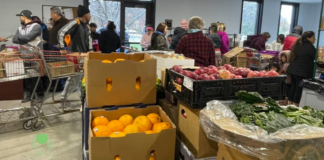If you teach a kid to fish…
My boys became quite the fishermen last summer thanks to a rainy weekend, and a well-sheltered boathouse spent on Stout Island in Northern Wisconsin. In a span of a couple of days, they learned how to hook their own worm, cast, reel, pose for a quick picture to show off their catch, and release.
While our weekend getaway didn’t quite go as planned due to the stormy weather, their newfound interest in fishing presented the perfect opportunity to introduce some abstract concepts that even I hadn’t considered. If you’ve ever spent time fishing, you know it is an exercise in patience; but there are some other valuable lessons that can be woven into the experience.
Here are two lessons you can teach to make the most out of your time spent on the dock:
#1: The Food Supply Chain: Just as tending to our own garden teaches children the multitude of steps, and amount of waiting it takes to be able to eventually pluck a ripe veggie out of the ground, fishing demonstrates the same “behind-the-scenes” work that we sometimes forget about. Thanks to the hard work of farmers and fishermen, there is (usually) always fresh food at the grocery store that we can buy, and put on our dinner table. But the supply chain extends beyond the fishermen and fish themselves— the transportation of our food from point A to point B is also a factor to consider. Truck drivers, and the individuals who load and unload the trucks, play just as much a role in making our food supply chains work.
#2: Preserving Natural Habitats: Of course, both boys desperately begged to keep every fish they caught, and since we typically catch the “catch and release” kind, it lent itself perfectly to a conversation about the importance of allowing the fish to get bigger before we keep them. By staying in their natural habitat longer, they can reproduce (or, “make a bigger family”) which helps preserve the balance of their natural environment. How far you want to go down the rabbit hole with this will of course, depend on the age of your angler. Simply put, overfishing can impact entire ecosystems. When too many fish are taken out of the natural environment, it creates an imbalance that can have negative effects on the food web, which ultimately could lead to extinction of vulnerable species.
To make sure our catch is able to survive once returned to the water, we remove the hook as quickly as we can. We use gloves so that we can hold them firmly enough (their scales can get pokey!) to be able to remove the hook; and we’ll even employ a set of pliers if the hook doesn’t budge quick enough.
If for no other reason, I recommend taking your child to fish because there is nothing quite like the excitement of reeling a fish in together. We hope to make a trip back to Stout’s Island Lodge sometime next summer with better weather so that we can enjoy their water bikes, kayaks and jumping docks once and for all, but we’ll be sure to make some time to fish too.
Check out Best Fishing Spots for Kids in Madison, WI
**Don’t get caught fishing without a license! Unless you are younger than 15, or older than 95 years of age, you need a license to fish in the state of Wisconsin. Learn more here.












